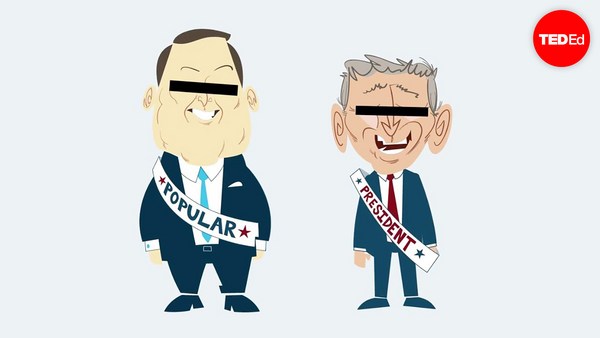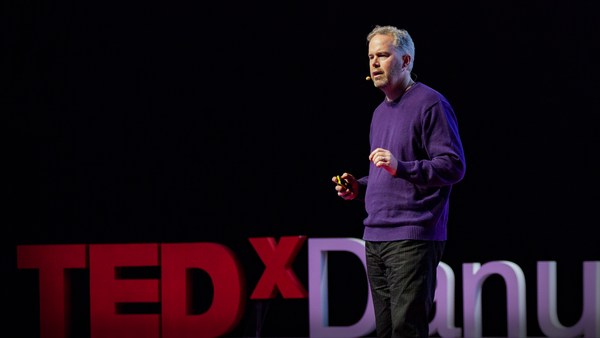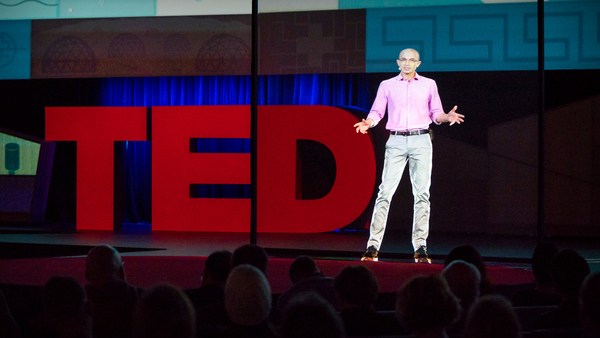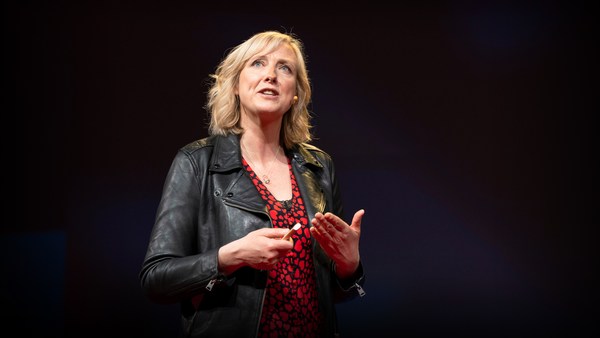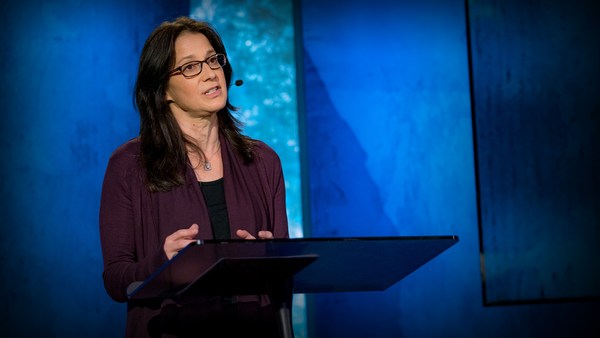Is it just me, or are there other people here that are a little bit disappointed with democracy?
(Applause)
So let's look at a few numbers. If we look across the world, the median turnout in presidential elections over the last 30 years has been just 67 percent. Now, if we go to Europe and we look at people that participated in EU parliamentary elections, the median turnout in those elections is just 42 percent. Now let's go to New York, and let's see how many people voted in the last election for mayor. We will find that only 24 percent of people showed up to vote. What that means is that, if "Friends" was still running, Joey and maybe Phoebe would have shown up to vote.
(Laughter)
And you cannot blame them because people are tired of politicians. And people are tired of other people using the data that they have generated to communicate with their friends and family, to target political propaganda at them. But the thing about this is that this is not new. Nowadays, people use likes to target propaganda at you before they use your zip code or your gender or your age, because the idea of targeting people with propaganda for political purposes is as old as politics. And the reason why that idea is there is because democracy has a basic vulnerability. This is the idea of a representative.
In principle, democracy is the ability of people to exert power. But in practice, we have to delegate that power to a representative that can exert that power for us. That representative is a bottleneck, or a weak spot. It is the place that you want to target if you want to attack democracy because you can capture democracy by either capturing that representative or capturing the way that people choose it. So the big question is: Is this the end of history? Is this the best that we can do or, actually, are there alternatives?
Some people have been thinking about alternatives, and one of the ideas that is out there is the idea of direct democracy. This is the idea of bypassing politicians completely and having people vote directly on issues, having people vote directly on bills. But this idea is naive because there's too many things that we would need to choose. If you look at the 114th US Congress, you will have seen that the House of Representatives considered more than 6,000 bills, the Senate considered more than 3,000 bills and they approved more than 300 laws. Those would be many decisions that each person would have to make a week on topics that they know little about. So there's a big cognitive bandwidth problem if we're going to try to think about direct democracy as a viable alternative.
So some people think about the idea of liquid democracy, or fluid democracy, which is the idea that you endorse your political power to someone, who can endorse it to someone else, and, eventually, you create a large follower network in which, at the end, there's a few people that are making decisions on behalf of all of their followers and their followers. But this idea also doesn't solve the problem of the cognitive bandwidth and, to be honest, it's also quite similar to the idea of having a representative. So what I'm going to do today is I'm going to be a little bit provocative, and I'm going to ask you, well: What if, instead of trying to bypass politicians, we tried to automate them?
The idea of automation is not new. It was started more than 300 years ago, when French weavers decided to automate the loom. The winner of that industrial war was Joseph-Marie Jacquard. He was a French weaver and merchant that married the loom with the steam engine to create autonomous looms. And in those autonomous looms, he gained control. He could now make fabrics that were more complex and more sophisticated than the ones they were able to do by hand. But also, by winning that industrial war, he laid out what has become the blueprint of automation.
The way that we automate things for the last 300 years has always been the same: we first identify a need, then we create a tool to satisfy that need, like the loom, in this case, and then we study how people use that tool to automate that user. That's how we came from the mechanical loom to the autonomous loom, and that took us a thousand years. Now, it's taken us only a hundred years to use the same script to automate the car. But the thing is that, this time around, automation is kind of for real.
This is a video that a colleague of mine from Toshiba shared with me that shows the factory that manufactures solid state drives. The entire factory is a robot. There are no humans in that factory. And the robots are soon to leave the factories and become part of our world, become part of our workforce. So what I do in my day job is actually create tools that integrate data for entire countries so that we can ultimately have the foundations that we need for a future in which we need to also manage those machines.
But today, I'm not here to talk to you about these tools that integrate data for countries. But I'm here to talk to you about another idea that might help us think about how to use artificial intelligence in democracy. Because the tools that I build are designed for executive decisions. These are decisions that can be cast in some sort of term of objectivity -- public investment decisions. But there are decisions that are legislative, and these decisions that are legislative require communication among people that have different points of view, require participation, require debate, require deliberation. And for a long time, we have thought that, well, what we need to improve democracy is actually more communication. So all of the technologies that we have advanced in the context of democracy, whether they are newspapers or whether it is social media, have tried to provide us with more communication. But we've been down that rabbit hole, and we know that's not what's going to solve the problem. Because it's not a communication problem, it's a cognitive bandwidth problem. So if the problem is one of cognitive bandwidth, well, adding more communication to people is not going to be what's going to solve it. What we are going to need instead is to have other technologies that help us deal with some of the communication that we are overloaded with. Think of, like, a little avatar, a software agent, a digital Jiminy Cricket --
(Laughter)
that basically is able to answer things on your behalf. And if we had that technology, we would be able to offload some of the communication and help, maybe, make better decisions or decisions at a larger scale. And the thing is that the idea of software agents is also not new. We already use them all the time. We use software agents to choose the way that we're going to drive to a certain location, the music that we're going to listen to or to get suggestions for the next books that we should read.
So there is an obvious idea in the 21st century that was as obvious as the idea of putting together a steam engine with a loom at the time of Jacquard. And that idea is combining direct democracy with software agents. Imagine, for a second, a world in which, instead of having a representative that represents you and millions of other people, you can have a representative that represents only you, with your nuanced political views -- that weird combination of libertarian and liberal and maybe a little bit conservative on some issues and maybe very progressive on others. Politicians nowadays are packages, and they're full of compromises. But you might have someone that can represent only you, if you are willing to give up the idea that that representative is a human. If that representative is a software agent, we could have a senate that has as many senators as we have citizens. And those senators are going to be able to read every bill and they're going to be able to vote on each one of them.
So there's an obvious idea that maybe we want to consider. But I understand that in this day and age, this idea might be quite scary. In fact, thinking of a robot coming from the future to help us run our governments sounds terrifying. But we've been there before.
(Laughter)
And actually he was quite a nice guy.
So what would the Jacquard loom version of this idea look like? It would be a very simple system. Imagine a system that you log in and you create your avatar, and then you're going to start training your avatar. So you can provide your avatar with your reading habits, or connect it to your social media, or you can connect it to other data, for example by taking psychological tests. And the nice thing about this is that there's no deception. You are not providing data to communicate with your friends and family that then gets used in a political system. You are providing data to a system that is designed to be used to make political decisions on your behalf. Then you take that data and you choose a training algorithm, because it's an open marketplace in which different people can submit different algorithms to predict how you're going to vote, based on the data you have provided. And the system is open, so nobody controls the algorithms; there are algorithms that become more popular and others that become less popular. Eventually, you can audit the system. You can see how your avatar is working. If you like it, you can leave it on autopilot. If you want to be a little more controlling, you can actually choose that they ask you every time they're going to make a decision, or you can be anywhere in between. One of the reasons why we use democracy so little may be because democracy has a very bad user interface. And if we improve the user interface of democracy, we might be able to use it more.
Of course, there's a lot of questions that you might have. Well, how do you train these avatars? How do you keep the data secure? How do you keep the systems distributed and auditable? How about my grandmother, who's 80 years old and doesn't know how to use the internet? Trust me, I've heard them all. So when you think about an idea like this, you have to beware of pessimists because they are known to have a problem for every solution.
(Laughter)
So I want to invite you to think about the bigger ideas. The questions I just showed you are little ideas because they are questions about how this would not work. The big ideas are ideas of: What else can you do with this if this would happen to work? And one of those ideas is, well, who writes the laws? In the beginning, we could have the avatars that we already have, voting on laws that are written by the senators or politicians that we already have. But if this were to work, you could write an algorithm that could try to write a law that would get a certain percentage of approval, and you could reverse the process. Now, you might think that this idea is ludicrous and we should not do it, but you cannot deny that it's an idea that is only possible in a world in which direct democracy and software agents are a viable form of participation.
So how do we start the revolution? We don't start this revolution with picket fences or protests or by demanding our current politicians to be changed into robots. That's not going to work. This is much more simple, much slower and much more humble. We start this revolution by creating simple systems like this in grad schools, in libraries, in nonprofits. And we try to figure out all of those little questions and those little problems that we're going to have to figure out to make this idea something viable, to make this idea something that we can trust. And as we create those systems that have a hundred people, a thousand people, a hundred thousand people voting in ways that are not politically binding, we're going to develop trust in this idea, the world is going to change, and those that are as little as my daughter is right now are going to grow up. And by the time my daughter is my age, maybe this idea, that I know today is very crazy, might not be crazy to her and to her friends. And at that point, we will be at the end of our history, but they will be at the beginning of theirs.
Thank you.
(Applause)
